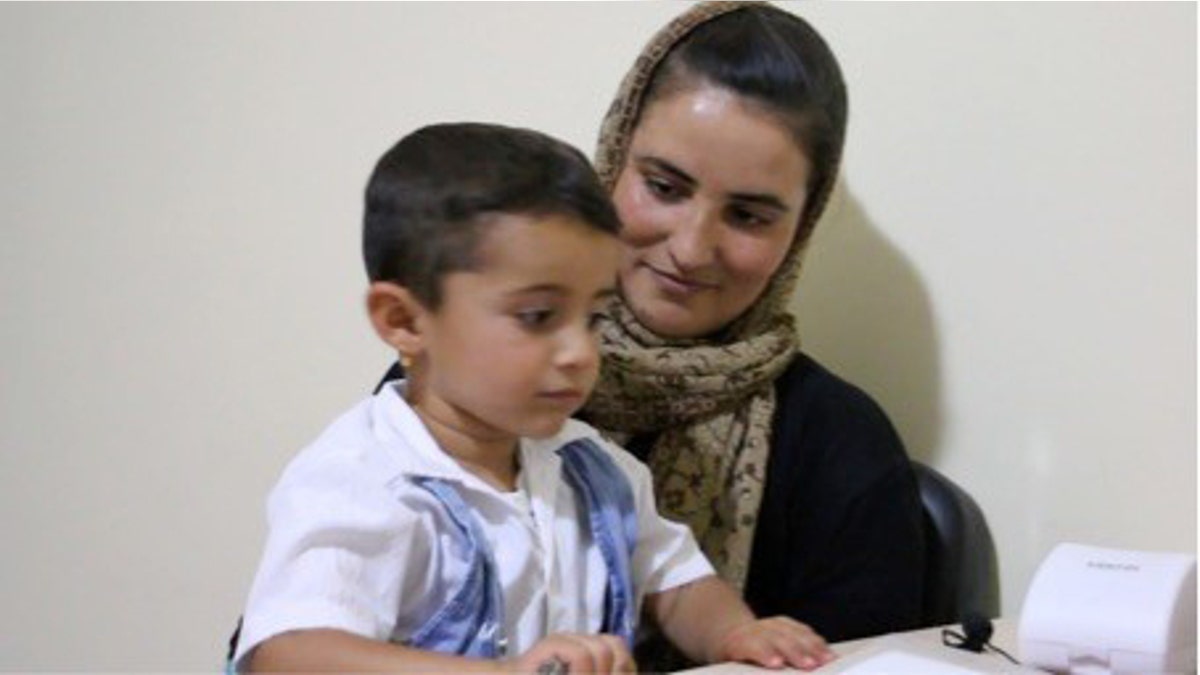
(Siri and Jamil, courtesy Dr. Jan Kizilhan)
Six-year-old Jamil starts school on September 11. There will be no ISIS fighters in his first grade class in Ulm, Germany, but Jamil, haunted by nightmares, is still fighting the ISIS demons.
The boy’s ordeal began in northern Iraq on August 3, 2015. Then four-years-old, he was one of many Yazidis captured by ISIS, crammed into a bus, and taken to Mosul, the second largest city in Iraq, then under ISIS control.
The Yazidi people are an ancient, non-Muslim religious community regarded by radical Islamists as infidels worthy of death. Thousands of Yazidis have been murdered, or displaced, by ISIS in a genocidal campaign waged against them since 2014. The women have been taken as sexual slaves.
The United Nations estimates that 10,000 Yazidis have been killed, or kidnapped, by ISIS with a staggering 500,000 displaced.
Jamil’s mother had disappeared in a rush to escape ISIS, and he was alone on the bus that sweltering day in August. A bearded ISIS fighter stood at the front of the bus, brandishing an automatic gun.
The women were ordered to sit on one side, with the children sitting across from them. The ISIS gunman moved down the aisle asking the women about their marital status, and whether they were mothers.
Sixteen-year-old Siri, sitting on the women’s side of the bus, thought she had a better chance of avoiding rape by pretending to be married and a mother. She told the gunman her husband was killed in the war and claimed she was the mother of a crying boy across the aisle.
“Is this your little bastard,” the gunman had asked.
Jamil, seemingly unaware of the exchange, said nothing. It was the first time Siri and Jamil met.
Soon after Siri and Jamil arrived in Mosul, an ISIS guard threatened to kill Jamil if Siri refused to have sex with him. The guard took Siri next door and raped her, while she shouted in pain and wept uncontrollably. The rapist, called “The Tunisian,” told Siri her situation would improve if she became a Muslim and married him. She refused. He continued to rape her.
Whenever Siri would return to the room she shared with Jamil, after having been raped, he would invariably run his hands over her face and caress her hair. Jamil didn’t know what had been happening to Siri, but he knew she was in distress, and he tried to comfort her.
Despite the trauma of rape, Siri took on the role of mother, and never stopped showing Jamil love. She would sing him to sleep each night with lullabies.
After several months, “The Tunisian” declared that Siri was no longer attractive and sold her and Jamil to another ISIS member.
Kurdish troops eventually freed them from ISIS, and a year later, Jamil’s real mother was found. She was very depressed, having searched in vain for her missing husband and other family members.
Dr. Jan Kizilhan, a German doctor of Kurdish background, told the story of Jamil and Siri to Fox News in a telephone interview. Kizilhan provides treatment for many victims of the war in Iraq at a clinic near Stuttgart, Germany. He visits northern Iraq regularly and brings severely traumatized Yazidis back to Germany for treatment.
He has been treating Siri and Jamil for trauma.
“The link between Siri and Jamil was more than that of a mother and a boy,” said Kizilhan. “This was a special bond because when Jamil was in great difficulty, Siri was there for him. He knew he was not alone. She was the key to his survival.”
At the same time, Jamil was the key to Siri’s survival. She told Kizilhan that she considered suicide many times because of the shame of rape in Yazidi culture, but decided against it.
“She decided against ending her life,” said Kizilhan, “Because there would be no one to care for Jamil if she were gone.”
When sitting with Siri and his birth mother, Jamil now always sits closer to Siri, observed Kizilhan observed. Their shared trauma binds them together. She has become his second mother.








































